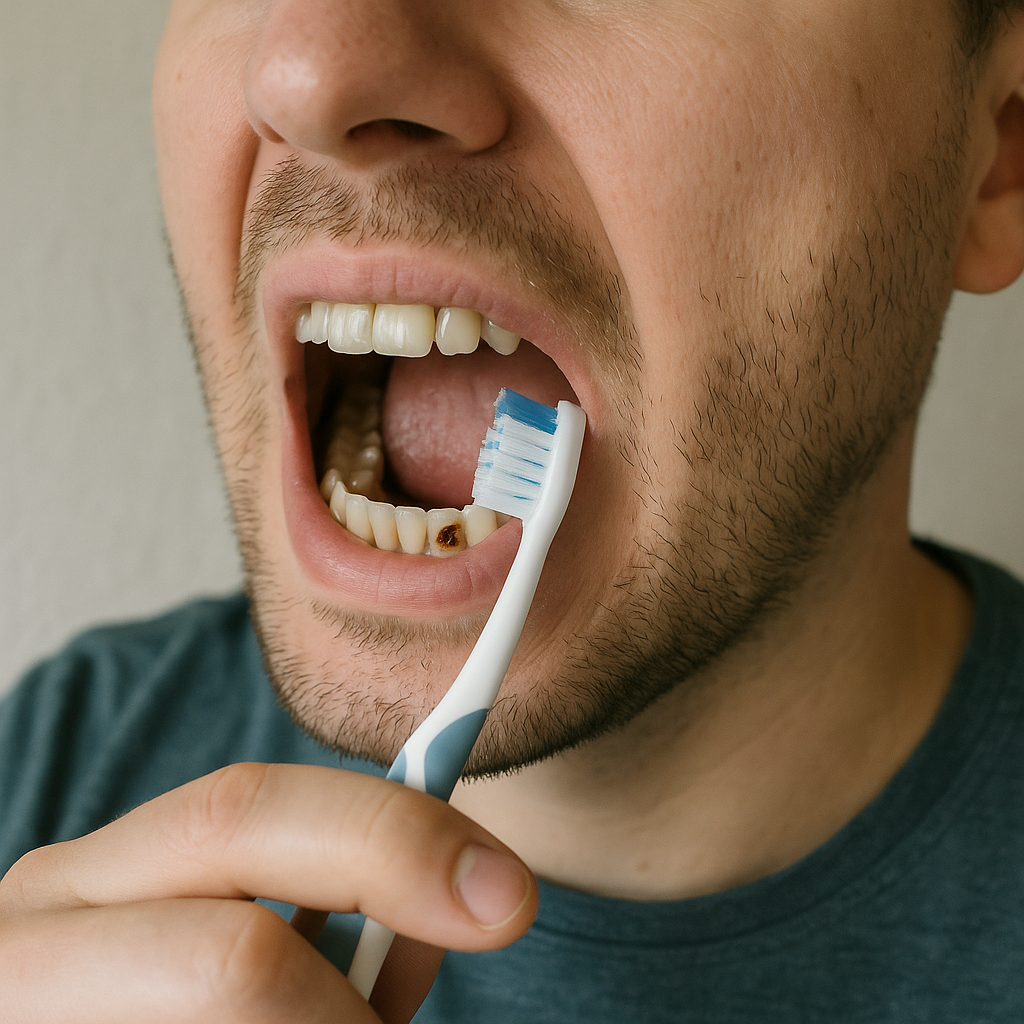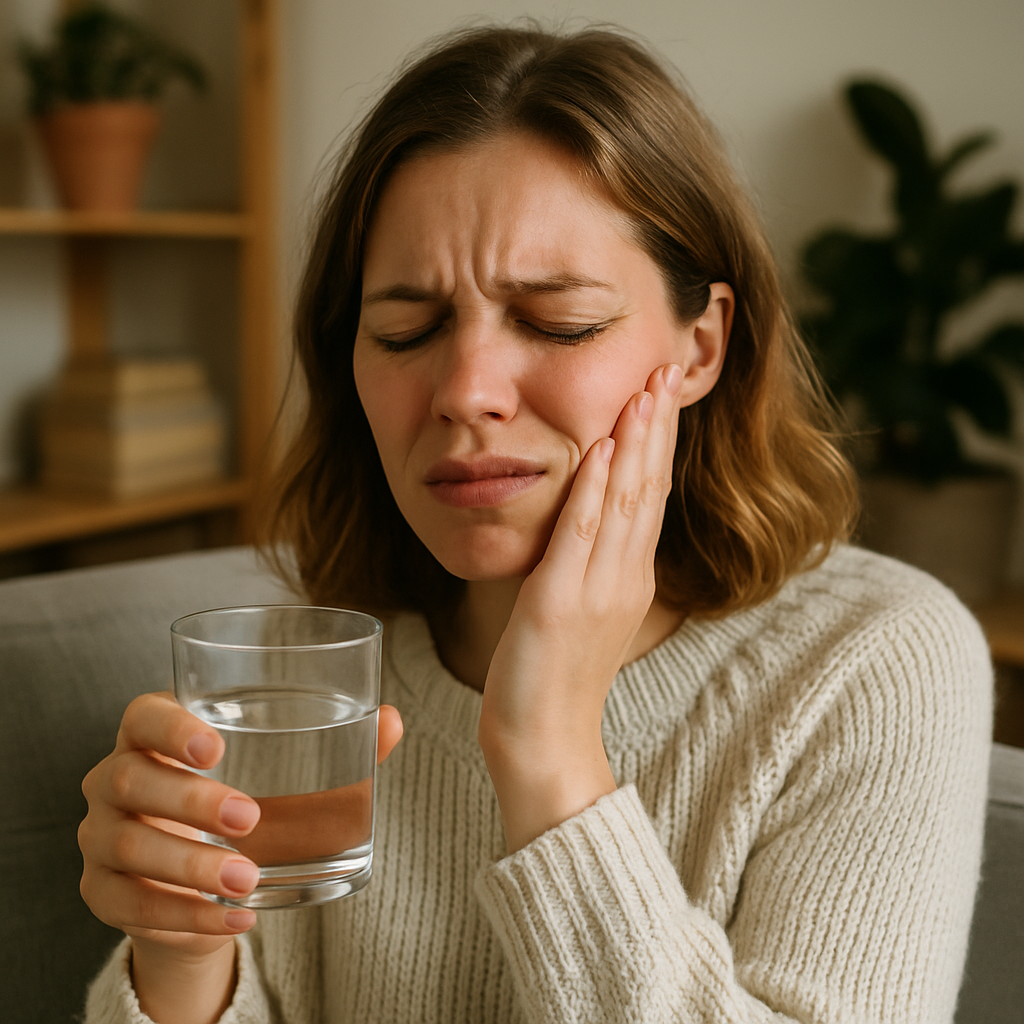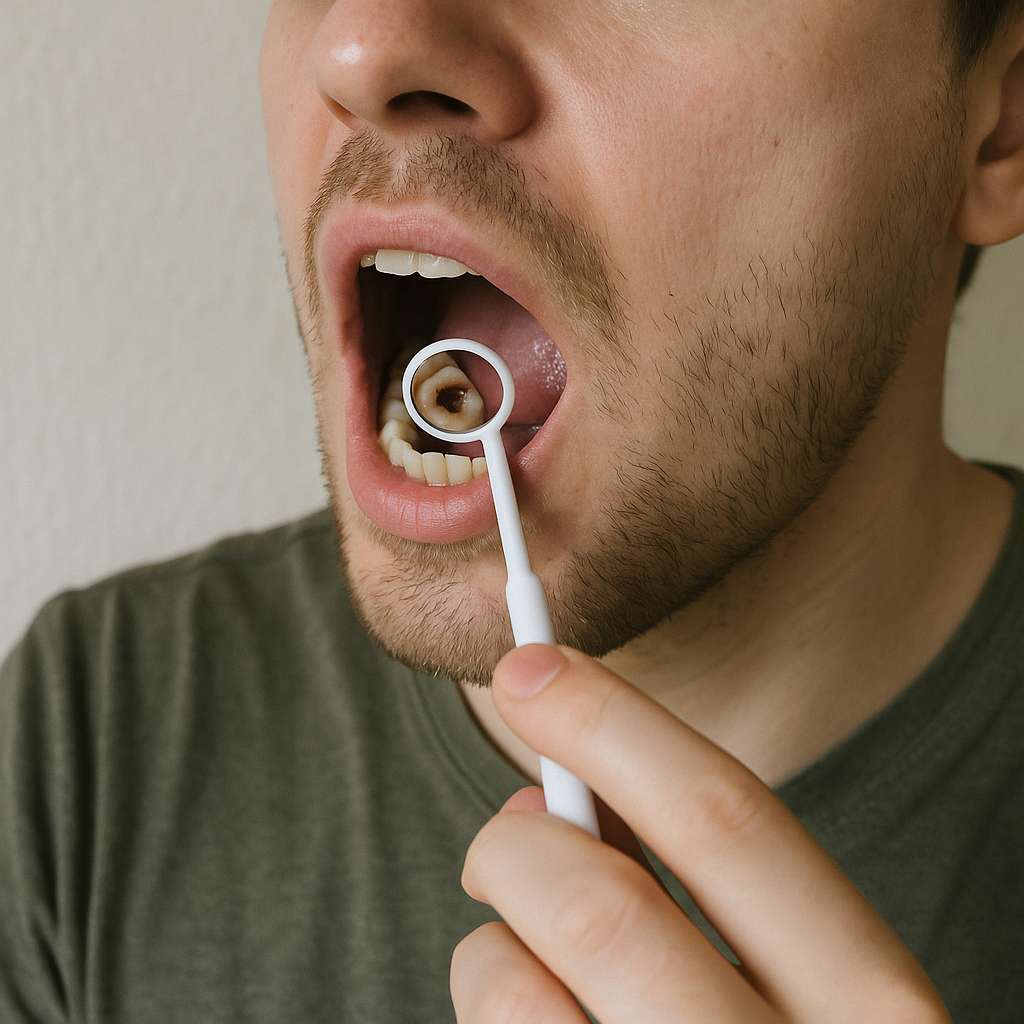Ask Ayurvedic doctor a question and get a consultation online on the problem of your concern in a free or paid mode. More than 2,000 experienced doctors work and wait for your questions on our site and help users to solve their health problems every day.
How to Cure Cavity at Home: Natural Remedies and Ayurvedic Tips

Toothaches and dental appointments aren't anyone’s idea of a good time. If you’ve been searching for how to cure cavity at home, how to clean cavity teeth at home, or how to get rid of cavity at home, you're not alone. Millions of people are looking for ways to handle tooth decay from the comfort of their own home—without breaking the bank or facing the dental drill. Luckily, with the right approach and a little consistency, you can take real steps to reduce and even reverse early-stage cavities naturally. But can we cure cavity at home completely? Well, let’s dive in and find out.
This guide explores practical, Ayurvedic-backed techniques and everyday habits to help you fix a cavity at home. While not a replacement for professional dental care in severe cases, these methods are incredibly helpful in the early stages of decay. Plus, we’ll cover how to cure cavity pain at home, how to support your enamel, and the top herbs that actually make a difference.
What Is a Cavity and Why It Happens
Tooth Decay Causes: Diet, Bacteria, and Oral Hygiene
A cavity starts forming when the enamel—the hard, protective layer of your teeth—begins to break down. This is usually caused by a combo of sugar, acidic foods, harmful bacteria, and poor oral hygiene. If you’re snacking on sweets or sipping soda throughout the day, that sugar feeds bacteria, which in turn produce acid. Over time, this acid eats away at your enamel. Ouch.
It doesn't happen overnight though. In many cases, with early tooth decay self-care, you can stop or even reverse the damage before it becomes a full-blown cavity.
Ayurvedic View on Cavity Formation
According to Ayurveda, tooth decay is linked to an imbalance in the Kapha and Vata doshas, especially when there's an excess of ama (toxins) in the mouth. Factors like improper digestion, poor diet, and not following dinacharya (daily routine) can all lead to weakened gums and vulnerable enamel. Ayurvedic texts recommend detoxifying the body and applying herbal remedies to restore oral health.
Interestingly, this aligns closely with modern research that shows how the mouth is deeply connected to overall health. So yeah, ancient wisdom had it right.
Can We Cure Cavity at Home?
The short answer is: sort of. If the cavity is in its early stages—meaning no deep hole yet—you can reduce cavity at home and even help your enamel remineralize. But if you're dealing with pain, swelling, or a visible black pit? It's time to see a dentist, friend. There’s only so much turmeric can do.
Still, don’t underestimate the power of daily habits. You’d be surprised how far a good home routine and Ayurvedic herbs can take you.

Early Signs of Tooth Cavity and When You Can Reverse It
Symptoms to Watch For: Sensitivity, Pain, Visible Spots
It usually starts with a little tingling when you eat something cold or sweet. Then maybe you notice a white spot on your tooth—this is the earliest visible sign of demineralization. As it progresses, the tooth might become brownish, rough, or slightly painful. That’s your enamel waving a white flag.
Catch it early, and you can cure cavity teeth at home using natural remedies and mindful eating. Miss the signs, and you’ll be booking that dentist appointment sooner than you wanted.
When Is It Too Late for Natural Remedies?
Once the decay penetrates the dentin (the softer layer beneath enamel), it’s a race against time. At that point, most teeth cavity treatment at home won’t be enough. If you’re feeling a sharp, stabbing pain or noticing a bad smell from a tooth, it’s probably too late for DIY fixes. Better to get it looked at before it gets infected.
Importance of Early Tooth Decay Self-Care
Taking cavity symptoms seriously early on is key. Not only can you reduce and fix cavity at home more easily at this stage, but you also avoid the need for fillings, crowns, or worse—root canals. It’s not just about avoiding pain either; untreated cavities can affect digestion, energy, and even heart health. Wild, right?

How to Cure Cavity at Home Naturally
When it comes to how to cure cavity naturally at home, your kitchen and spice cabinet might hold more answers than you think. Ayurveda has long promoted natural healing through herbs, oils, and diet. And no, it’s not just old-school folk wisdom — a growing body of research backs these methods for early-stage teeth cavity treatment at home.
Best Ayurvedic Herbs and Oils
1. Clove (Laung):
Clove oil is a powerhouse when it comes to how to cure cavity pain at home. Its active ingredient, eugenol, has natural analgesic and antibacterial properties. Just dab a tiny bit of clove oil on a cotton swab and apply it directly to the sore tooth. Careful, though—it’s strong, and you don’t want to overdo it.
2. Neem (Azadirachta indica):
Used in Ayurvedic toothpastes and powders, neem fights harmful bacteria and supports gum health. You can chew on neem sticks or make a simple paste from dried neem powder and water to brush your teeth.
3. Licorice Root:
Surprisingly sweet and totally cavity-friendly, licorice has been shown to reduce Streptococcus mutans, the main bacteria responsible for decay. Try rinsing with licorice tea or adding it to your natural toothpaste routine.
4. Triphala:
This Ayurvedic blend of three fruits (amla, bibhitaki, and haritaki) is known for detoxifying the mouth and supporting immune function. Use it as a mouth rinse or drink it regularly to promote healing from the inside out.
How to Clean Cavity Teeth at Home Using Herbal Pastes
Let’s get hands-on. Here's a DIY herbal paste you can make at home:
-
½ tsp turmeric powder
-
A pinch of clove powder
-
A few drops of sesame or coconut oil
-
¼ tsp neem powder (optional)
Mix into a thick paste. Brush gently with this paste twice a day, especially around the area of the cavity. It doesn’t taste like mint gum, but your teeth will thank you.
Turmeric fights inflammation, while clove numbs pain and kills germs. Sesame oil has pulling properties (more on that in a bit), and neem helps kill cavity-causing bacteria. This is a great way to clean cavity teeth at home while also soothing inflamed areas.
How to Reduce and Fix Cavity at Home Step-by-Step
Step 1: Oil Pulling
Start your day by swishing 1 tbsp of coconut or sesame oil in your mouth for 10–15 minutes. Yes, it feels weird at first, but this ancient Ayurvedic practice draws toxins and bacteria from the mouth. Spit it out (not in the sink!) and rinse.
Step 2: Herbal Brushing
Use the paste above, or find an Ayurvedic toothpaste with neem, clove, or babool. Brush gently—don’t go scrubbing like you're cleaning grout.
Step 3: Rinse with Saltwater or Herbal Tea
Boil some guava leaves or triphala and use the decoction as a mouth rinse. Or just stick with warm salt water—simple, cheap, and super effective for early decay.
Step 4: Repeat Consistently
Natural treatments don’t work overnight. Give it 2–4 weeks and observe if pain reduces or white spots fade. You might not remove teeth cavity at home completely, but you’ll slow it down big time.

Home Treatments to Relieve Cavity Pain and Support Enamel
You’ve got your herbal paste, you’re oil pulling daily—now what about that dull (or sometimes stabby) pain that won’t quit? Here's how to cure cavity pain at home while helping your enamel hang on.
How to Cure Cavity Pain at Home with Clove and Licorice
As mentioned before, clove oil is a tried-and-true remedy for dental pain. Dab it directly onto the cavity with a Q-tip, but if it's too intense, mix it with coconut oil to dilute.
Licorice root, on the other hand, is a gentle warrior. You can steep it in hot water and use the cooled liquid as a rinse. It helps soothe the gums and reduce inflammation. Do this 2-3 times a day, especially before bed.
Also, don’t forget cold compresses. Press a cold cloth on your cheek (outside the painful area) to dull the ache temporarily. It’s simple, but super underrated.
Foods to Avoid and Include for Tooth Mineral Support
You can’t talk about how to cure cavity teeth at home without addressing what goes in your mouth every day.
Avoid:
-
Sugary snacks (obviously)
-
Sticky candies (lookin' at you, caramel)
-
Acidic drinks like soda and too much citrus
-
Constant snacking (it feeds bacteria and doesn't let saliva do its thing)
Include:
-
Leafy greens for calcium and magnesium
-
Cheese and yogurt (good for enamel, bad for plaque if you don’t rinse after)
-
Green tea, which has natural fluoride and bacteria-fighting powers
-
Bone broth, rich in minerals that help remineralize teeth naturally
Hydration also plays a big role. Dry mouth = more bacteria. So keep the water bottle close.

Long-Term Prevention of Tooth Cavities Naturally
The real secret to how to fix cavity at home? Don’t get more cavities. Prevention is boring but it’s way better than dealing with throbbing teeth.
Daily Oral Care Routine with Ayurvedic Practices
-
Morning: Oil pull before brushing
-
Brush: Use a natural paste or powder with neem, clove, or miswak
-
Rinse: Herbal teas or saltwater
-
Scrape your tongue: Removes toxins and improves oral flora
-
Evening: Gentle brushing again (skip the mouthwash—it kills good bacteria too!)
Don’t skip days. This only works if you stick with it. Like, your teeth don't take days off, so neither should your care routine.
Conclusion
To wrap it up: yes, you can cure cavity at home—if it’s caught early. From using Ayurvedic herbs like neem and clove to practicing oil pulling and following a cavity-friendly diet, these steps can actually help you heal and protect your teeth naturally.
But let’s be real. If the cavity’s already deep or painful, please go to a dentist. Even the best DIY won’t save a tooth that's already screaming for help.
Consistency and care are your best tools. So start slow, stick with it, and maybe—just maybe—you won’t dread that next dental checkup.
FAQs
How to get rid of cavity pain at home instantly?
Clove oil is the fastest natural fix. Dab it directly on the tooth for near-instant numbing. A cold compress on the cheek can also dull pain quickly.
What is the best Ayurvedic treatment for cavity teeth?
Neem and clove top the list. Use them in powdered form for brushing, or apply clove oil directly for pain relief. Oil pulling with sesame oil is another daily must.
How to clean cavity teeth at home using herbs?
Make a paste of turmeric, clove powder, and coconut oil. Use this to brush gently twice a day. You can also rinse with herbal teas like guava leaf or triphala decoctions.

